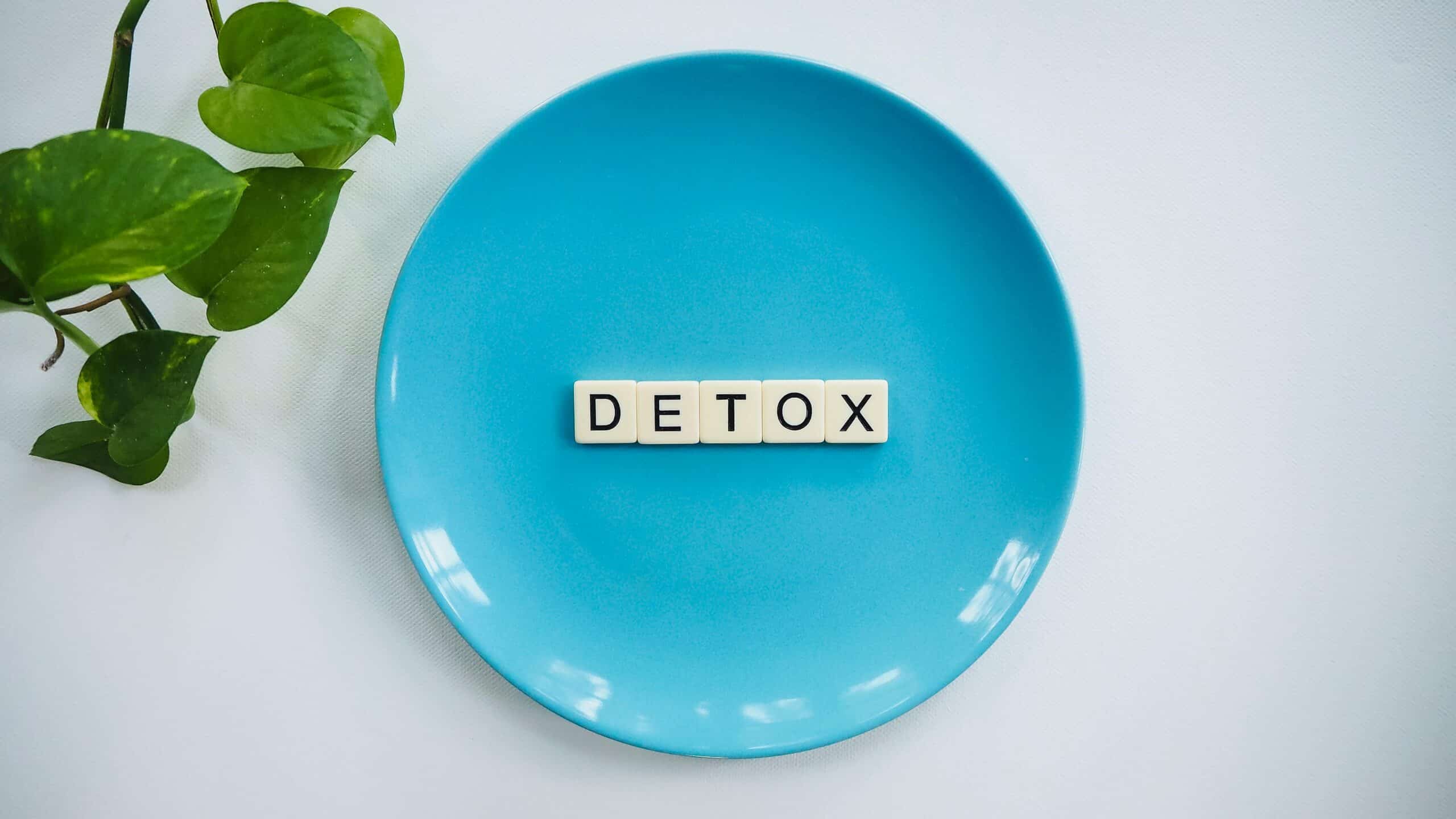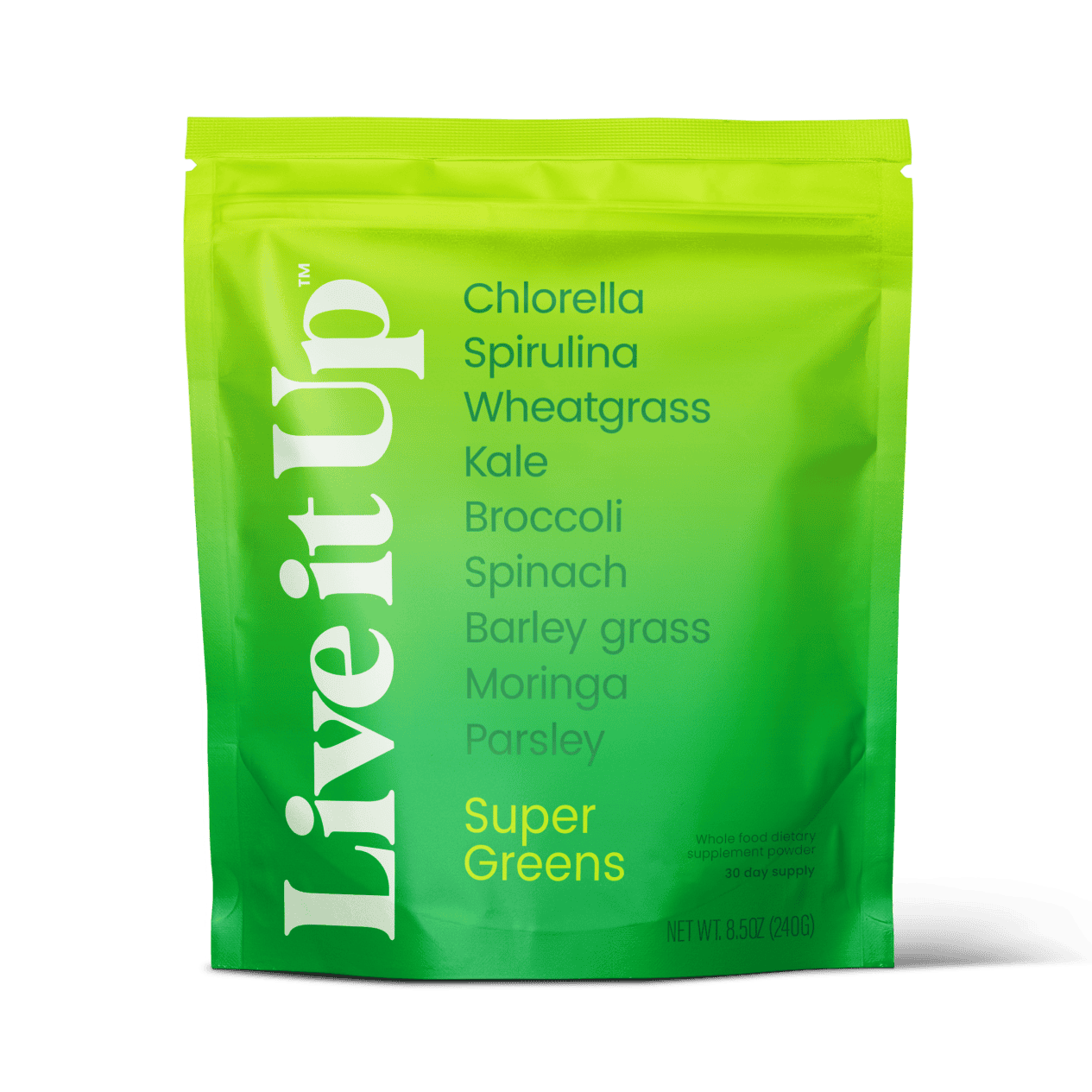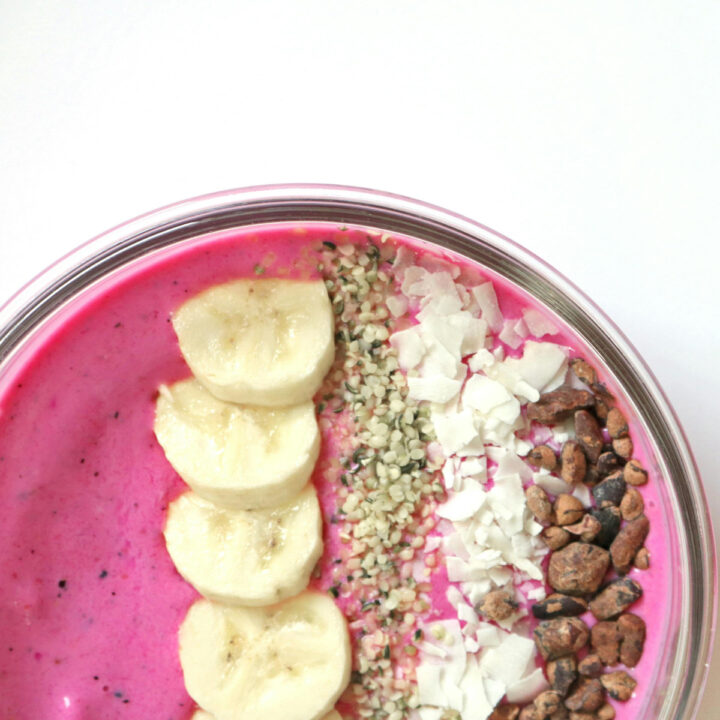
Jump to:
Gut health plays a crucial role in overall well-being, impacting digestion, immunity, energy levels, and even mental health. A balanced gut microbiome supports nutrient absorption, reduces inflammation, and promotes smooth digestion. However, an imbalanced gut can lead to issues such as bloating, irregular digestion, low energy, and food intolerances.
If you’re experiencing digestive discomfort or just want to optimize your gut health, a gut health reset can help restore balance. For vegans, the key to a thriving microbiome lies in fiber-rich whole foods, fermented foods, and targeted supplements like prebiotics and probiotics.
Discover why greens powders could be the perfect supplement for restoring your gut health!
This guide will walk you through everything you need to know to reset your gut health naturally on a vegan diet, with expert-backed strategies and a structured meal plan to get you started.
What Is a Gut Health Reset?

A gut health reset is a structured dietary and lifestyle approach designed to rebalance your gut microbiome and improve digestion.
Unlike a traditional cleanse or detox, which often relies on juice fasting or elimination diets, a gut health reset focuses on nourishing the gut with high-fiber foods, probiotics, and prebiotics to support long-term gut health.
Key Benefits of a Gut Health Reset
By eliminating harmful foods, replenishing beneficial gut bacteria, and nourishing the microbiome with fiber-rich plant-based foods, you can experience noticeable improvements in how you feel every day.
Here are some of the key benefits of resetting your gut health:
- Improved digestion: Reduced bloating, gas, and constipation.
- Better nutrient absorption: Maximizes the benefits of plant-based foods.
- Boosted immunity: A healthier gut microbiome supports a stronger immune system.
- Balanced energy levels: Fewer energy crashes due to stable blood sugar and better metabolism.
- Reduced inflammation: Helps soothe gut lining and ease food sensitivities.
By making intentional dietary changes and prioritizing gut-friendly foods, you can restore balance to your digestive system and build a foundation for long-term health.
Signs Your Gut Needs a Reset

Your gut plays a vital role in digestion, immunity, and even mental health. When it's out of balance, it can send warning signals that shouldn't be ignored.
If you've been experiencing persistent digestive discomfort, unexplained fatigue, or frequent food sensitivities, your gut health may need some attention. These symptoms often indicate an imbalance in the gut microbiome, which stress, diet, medications, or lifestyle habits can cause.
Recognizing these signs early can help you take proactive steps toward restoring gut health and improving overall well-being.
Here are some common signs that indicate your gut might need a reset:
- Digestive issues: Bloating, irregular bowel movements, constipation, or diarrhea.
- Low energy and fatigue: Poor gut health can impact nutrient absorption, leading to sluggishness.
- Food intolerances and sensitivities: An imbalanced gut can contribute to difficulty digesting certain foods.
- Skin issues: Acne, eczema, and other skin problems can often be traced back to gut health.
- Frequent illness: A weak gut microbiome can lower immune function, making you more susceptible to colds and infections.
If you’ve noticed any of these symptoms, resetting your gut health with a well-structured plan can help restore balance and alleviate discomfort.
The Science Behind Gut Health & Veganism

Your gut microbiome is an ecosystem of trillions of bacteria, fungi, and other microorganisms that play a crucial role in digestion, immune function, and even mental health. A well-balanced gut microbiome supports efficient digestion, enhances nutrient absorption, and helps protect against harmful bacteria.
However, when imbalanced, it can lead to digestive discomfort, weakened immunity, and inflammation.
The Role of Fiber, Probiotics, and Prebiotics
A vegan diet can be incredibly beneficial for gut health, thanks to its high fiber content. Fiber acts as fuel for beneficial gut bacteria, promoting the production of short-chain fatty acids that support digestive health and reduce inflammation.
In addition to fiber, prebiotics and probiotics play essential roles:
- Prebiotics: Found in plant-based foods like onions, garlic, asparagus, and bananas, prebiotics feed the good bacteria in your gut, helping them thrive.
- Probiotics: Naturally occurring in fermented foods like kimchi, sauerkraut, miso, and dairy-free yogurt, probiotics introduce beneficial bacteria to your gut, supporting microbial balance.
Did You Know That Greens Powders Can Help Heal the Gut?
Many people struggle to get enough gut-friendly nutrients through diet alone. This is where greens powders can help. Some high-quality greens powders contain prebiotics and probiotics, making them a convenient way to support gut health.
If you’re looking for a well-rounded greens powder designed to promote digestive wellness, check out this guide to the best greens powders for gut health.
Challenges & Benefits of a Vegan Diet for Gut Health
While a vegan diet can provide excellent gut health benefits, there are also challenges to be aware of:
Benefits
- High fiber intake: Supports digestion and encourages beneficial gut bacteria.
- Naturally anti-inflammatory: Gut microbiomes and plant-based diets go hand-in-hand as vegan gut health meal plans are rich in antioxidants that reduce inflammation.
- Diverse microbiome support: Consuming a variety of whole foods introduces a wide range of beneficial bacteria to the gut.
Challenges
- Probiotic sources may be limited: Since most traditional probiotics come from dairy-based products, vegans need to seek out plant-based alternatives like fermented foods or supplements.
- Nutrient absorption concerns: Some essential nutrients for gut health, like vitamin B12 and omega-3s, may require supplementation in a vegan diet.
By incorporating fiber-rich foods, fermented plant-based options, and gut-healing greens powders, vegans can optimize their microbiome and maintain long-term digestive health.
How to Reset Your Gut Health on a Vegan Diet

Wondering how to reset your gut health? Resetting your gut health as a vegan requires a holistic approach that includes dietary changes, hydration, and lifestyle adjustments. By eliminating gut-disrupting foods, increasing fiber intake, and incorporating probiotics, you can restore balance to your digestive system.
Below is a step-by-step guide to help you optimize your gut health naturally.
Step 1: Remove Gut Disruptors
The first step in resetting your gut is to eliminate foods that contribute to inflammation, bacterial imbalances, and digestive discomfort. Many processed and artificial ingredients can harm the gut microbiome, making it harder for beneficial bacteria to thrive.
Foods to Limit or Avoid
- Processed foods: Packaged snacks, refined grains, and ultra-processed plant-based alternatives often contain preservatives and additives that disrupt gut health.
- Excess sugar and artificial sweeteners: These can fuel harmful bacteria and contribute to bloating and digestive issues.
- Alcohol and caffeine: Both can irritate the digestive tract and dehydrate the body, slowing digestion.
- Refined vegetable oils and seed oils: Found in many processed foods, these oils can contribute to inflammation and disrupt the gut barrier.
Making these eliminations even temporarily can help your gut microbiome reset and function more efficiently.
Step 2: Focus on Fiber & Prebiotics
Once you’ve removed inflammatory foods, the next step is to nourish your gut bacteria with fiber and prebiotics. Fiber acts as food for beneficial gut microbes, while prebiotics specifically feed probiotic bacteria, encouraging them to multiply and thrive.
Best High-Fiber Foods for Gut Health
- Flaxseeds and chia seeds: Packed with fiber and omega-3s that support digestion.
- Lentils and beans: Great plant-based sources of protein and fiber.
- Oats and quinoa: Provide soluble fiber that supports gut motility.
- Leafy greens and cruciferous vegetables: Kale, spinach, and broccoli help stimulate digestive enzymes.
Best Vegan Prebiotic Sources
- Onions and garlic: Contain inulin, a powerful prebiotic fiber.
- Asparagus and leeks: High in prebiotic compounds that feed gut-friendly bacteria.
- Bananas: Unripe bananas, which contain resistant starch, are especially beneficial for gut health.
A fiber-rich, prebiotic-filled diet helps build a strong foundation for better digestion and gut balance.
Step 3: Add Probiotics & Fermented Foods
While prebiotics feed existing gut bacteria, probiotics introduce new beneficial bacteria to the gut. Vegan probiotic sources are abundant, and adding them to your diet can help restore balance in the digestive system.
Some of the best vegan fermented foods make for excellent probiotics that can act as vegan gut health supplements.
Best Vegan Probiotic Foods
- Sauerkraut and kimchi: Fermented vegetables packed with live probiotics.
- Miso and tempeh: Soy-based fermented foods that support gut health.
- Kombucha: A probiotic-rich fermented tea with beneficial bacteria and organic acids.
- Dairy-free yogurt: Look for varieties with live active cultures to promote gut flora balance.
Regularly consuming a variety of these probiotic-rich foods can enhance digestion and support a thriving gut microbiome.
Step 4: Hydration & Herbal Support
Proper hydration is essential for gut health, as water helps move fiber through the digestive tract and supports the absorption of nutrients. Herbal teas can also provide additional digestive support.
Hydration Tips for Better Digestion
- Drink at least 8-10 glasses of water per day: This helps prevent constipation and promotes gut motility.
- Consume hydrating fruits and vegetables: Cucumbers, celery, and watermelon provide additional hydration.
- Limit dehydrating drinks: Alcohol, coffee, and sugary sodas can hinder proper digestion.
Best Herbal Teas for Gut Health
- Peppermint tea: Eases bloating and calms digestive discomfort.
- Ginger tea: Supports digestion and helps with nausea.
- Chamomile tea: Soothes inflammation and supports relaxation.
Staying hydrated and incorporating herbal support can improve digestion and help restore gut balance.
Step 5: Lifestyle Changes for a Healthy Gut
Gut health isn’t just about what you eat—it’s also about how you live. Stress, poor sleep, and a sedentary lifestyle can negatively impact digestion. Making small lifestyle adjustments can go a long way in promoting gut balance.
Ways to Support Gut Health Through Lifestyle Changes
- Manage stress: Chronic stress disrupts the gut-brain axis. Try meditation, deep breathing, or yoga to keep stress levels low.
- Prioritize sleep: Aim for 7-9 hours of restful sleep per night to support the body’s natural repair processes.
- Move your body daily: Regular movement, like walking, stretching, or strength training, helps stimulate digestion and maintain gut motility.
By addressing both dietary and lifestyle factors, you can create the optimal environment for a healthier gut and improved overall well-being.
Vegan Gut Health Food List
A well-balanced vegan diet offers plenty of gut-friendly foods that support digestion, nourish beneficial bacteria, and promote overall gut health. Incorporating a variety of fiber-rich fruits, vegetables, whole grains, nuts, and seeds can significantly improve digestion and help reset your microbiome.
Below is a comprehensive list of the best fruits and vegetables for gut health.
Best Fruits for Gut Health
Fruits are packed with fiber, antioxidants, and natural enzymes that support digestion. Many also contain prebiotics, which feed beneficial gut bacteria.
- Bananas: A great source of resistant starch, which promotes gut-friendly bacteria growth.
- Apples: Rich in pectin, a type of fiber that aids digestion and feeds probiotics.
- Berries (blueberries, raspberries, and blackberries): High in antioxidants and fiber to reduce gut inflammation.
- Kiwi: Contains actinidin, an enzyme that improves digestion and helps with bloating.
Best Vegetables for Gut Health
Vegetables provide essential vitamins, minerals, and fiber necessary for a diverse gut microbiome.
- Broccoli: A cruciferous vegetable rich in sulforaphane, a compound that promotes beneficial gut bacteria.
- Artichokes: High in inulin, a powerful prebiotic that enhances gut flora.
- Asparagus: Contains prebiotic fiber that helps feed healthy gut bacteria and supports digestion.
Whole Grains and Legumes for Gut Health
Whole grains and legumes are excellent sources of fiber, which plays a critical role in digestive health by promoting regular bowel movements and feeding probiotics.
- Oats: High in beta-glucan, a fiber that supports gut bacteria and aids digestion.
- Quinoa: A gluten-free grain that provides prebiotic fiber and essential amino acids.
- Lentils & Chickpeas: Packed with fiber, protein, and resistant starch to support gut microbiome diversity.
Nuts and Seeds for Gut Health
Nuts and seeds provide essential fatty acids, fiber, and minerals that contribute to a healthy digestive system.
- Chia Seeds: High in soluble fiber and omega-3s, which help digestion and reduce inflammation.
- Flaxseeds: Contain lignans and fiber that promote gut motility and beneficial bacteria.
- Walnuts: Rich in polyphenols and omega-3s, which help reduce gut inflammation and support microbiome health.
By incorporating these plant-based gut-friendly foods into your diet, you can naturally support your digestive system, improve nutrient absorption, and maintain long-term gut health.
Supplements to Support Gut Health

While a well-balanced vegan diet can do wonders for gut health, certain supplements can provide additional support by replenishing beneficial bacteria, aiding digestion, and repairing the gut lining.
Best Vegan Probiotics and Prebiotics
Probiotics introduce beneficial bacteria into the gut, while prebiotics act as food for these bacteria, helping them thrive. Look for vegan probiotic supplements that contain strains like Lactobacillus and Bifidobacterium, which support digestion and immunity.
Prebiotics, found in foods like chicory root and Jerusalem artichokes, can also be taken in supplement form for additional gut health benefits.
Digestive Enzymes and When to Use Them
Digestive enzymes help break down food more efficiently, reducing bloating and discomfort, especially for those with sensitivities to high-fiber plant-based foods.
Enzyme supplements containing amylase (for carbs), protease (for protein), and lipase (for fats) can be helpful when transitioning to a high-fiber diet or after a heavy meal.
L-Glutamine for Gut Lining Repair
L-glutamine is an amino acid known for its role in repairing and strengthening the gut lining. It helps reduce inflammation and supports those experiencing leaky gut, bloating, or food sensitivities.
Greens Powders for Gut Health
Greens powders offer a concentrated source of gut-nourishing nutrients, fiber, and prebiotics in an easy-to-consume format. Many formulas also include probiotics and digestive enzymes to enhance gut microbiome balance.
Our top greens powder choice is Live it Up Super Greens. This powder is specifically designed to restore and maintain gut health with a blend of organic greens, prebiotics, probiotics, and digestive enzymes. Adding a scoop to your morning routine can improve digestion, reduce bloating, and support long-term gut health.
Learn more about Live it Up here!
3-Day Vegan Gut Health Reset Sample Plan

A structured gut health reset can help rebalance the microbiome and improve digestion.
- Day 1: Focus on light, fiber-rich meals with easy-to-digest foods like smoothies, steamed vegetables, and soft whole grains.
- Day 2: Increase probiotic and prebiotic intake by adding fermented foods like sauerkraut and kimchi, along with prebiotic-rich sources like garlic and bananas.
- Day 3: Diversify your meals with a variety of fiber sources, legumes, and healthy fats to promote long-term gut microbiome diversity.
By following this simple 3-day reset, you’ll give your gut the support it needs to rebalance and function optimally.
Common Mistakes to Avoid When Resetting Gut Health
While resetting your gut health can be transformative, there are a few common pitfalls that can slow progress or cause discomfort.
- Going too fast: Increasing fiber too quickly can cause bloating. Gradually introduce gut-friendly foods.
- Ignoring hydration and stress management: Proper hydration and stress reduction are essential for a balanced gut.
- Relying solely on probiotics: Without prebiotics, probiotics won’t thrive. Ensure you’re feeding good bacteria with fiber-rich foods.
Avoiding these mistakes will help ensure a smooth transition to better digestion, improved nutrient absorption, and a stronger gut microbiome.
Ready, Set, Reset!
A gut health reset on a vegan diet involves removing gut disruptors, increasing fiber and probiotics, and supporting digestion with the right supplements. By following a structured plan, you can restore balance to your microbiome and enhance digestion.
The V Nutrition Editorial Team, consisting of experts in vegan nutrition and health, focuses on providing accurate and helpful information. With backgrounds in nutrition science and a shared commitment to plant-based living, we ensure that every piece of content not only educates but also empowers our readers to make informed lifestyle choices.
The V Nutrition Editorial Team, consisting of experts in vegan nutrition and health, focuses on providing accurate and helpful information. With backgrounds in nutrition science and a shared commitment to plant-based living, we ensure that every piece of content not only educates but also empowers our readers to make informed lifestyle choices.




Comments
No Comments